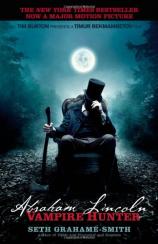Abraham Lincoln: Vampire Hunter
Review
Abraham Lincoln: Vampire Hunter
On March 4, 1861, Abraham Lincoln --- the exceptional boy of Sinking Springs Farm, apple of his departed mother’s eye, survivor of the trials of Job, and one of the nation’s most accomplished vampire hunters --- was sworn in as the 16th President of the United States. There have been over 15,000 books written about Lincoln, but none as ambitious and shocking as Seth Grahame-Smith’s ABRAHAM LINCOLN: VAMPIRE HUNTER.
Lincoln’s alternative life as a hunter of vampires is traced back to his youth. At nine years old, he suffered the loss of his mother from a mysterious ailment the locals called “the milk sickness.” It was only upon further inspection --- and listening to local gossip --- that he discovered his mother was the victim of a local vampire named Jack Barts. The fact that his father may have known the truth behind her death was unbearable for him to deal with, and he made a pledge of vengeance at his mother’s graveside to eliminate all vampires from his country.
Before entering into the lost journals of Abraham Lincoln, the novel has a Prologue in which the author himself is a character. While working in a store in Rhinebeck, New York, Seth Grahame-Smith is visited by an odd stranger named Henry, who leaves him a beat-up old book and a note indicating that he should read it and publish his findings. Little does Grahame-Smith realize that he holds in his hands the journals of Lincoln that the public never saw, which explored the dark heart of the young nation and the impact made upon its history by the undead creatures known as vampires.
What follows is, allegedly, the transposing of these journals by the author. Following the death of his mother, Lincoln seeks to learn as much as he can about vampires. After having some early success in recognizing, hunting down and slaying vampires, he is approached by a shadowy figure named Henry Sturges. Henry is actually a vampire --- but one who laments his own curse of eternal life --- and has made it his business to take action against those of his own kind who are utilizing their demonic powers for evil means. Henry begins sending Lincoln notes with names of various vampires --- several of whom are well-known public figures --- and Lincoln uses his vampire-hunting talents to eliminate these “children of the night.”
During his time as a vampire hunter, Lincoln befriends a small group of comrades with whom he shares his dark secret and utilizes their assistance in his war against vampires. He even crosses paths with a diminutive author from Baltimore named Poe who is on a similar quest. The only difference is that Poe is in awe of these undead creatures and wants to learn all he can about them so that he may include these facts in some of his dark fiction.
As Lincoln travels the country and moves about with his family as well as in pursuit of work, he begins to understand how slavery is becoming a major divisive issue in America. He also sees that negro slaves, typically living under the radar of white society, are easy prey for the growing numbers of vampire hordes that have migrated from Europe to the U.S. Lincoln writes in his journal in 1828, “So long as this country is cursed with slavery, so too will it be cursed with vampires.” This fact gives even more incentive for Lincoln to abolish slavery in his lifetime. He recognizes that the migration of vampires from Europe and other dark corners of the planet are due to the fact that his nation holds some special attraction for them because they can feed on human blood in America without fear of discovery or reprisal.
Further inspection shows that the infamous Blood Countess, Elizabeth Bathory, and the thousands she was accused of slaying in vampiric rituals brought about the mass chasing of the undead from the European continent and to America. Poe tells Lincoln that America was a paradise where vampires could exist without fierce competition over blood. Fueled by this information, along with his own experience as a vampire hunter, Lincoln realizes he can do the most damage to the vampire faction by rising to elected office. Backed by Henry Sturges and a cadre of influential, like-minded vampires, he is able to do just that. When elected the 16th President, Lincoln is faced with the advent of the Civil War as well as a Confederate republic that is fully infiltrated by the vampire legion.
ABRAHAM LINCOLN: VAMPIRE HUNTER traverses throughout all the battles and turning points of the Civil War and deftly uncovers the vampire presence beneath the surface. As with all work dealing with the subject of Honest Abe, this novel would not be complete without confronting the topic of his assassination at the hands of actor John Wilkes Booth. Of course, Booth is depicted not only as a Confederate sympathizer but also as a vampire himself!
I praise Seth Grahame-Smith’s ambitious work and trust that he will continue to blend horror and classic literature/historical figures in the future. The fact that Tim Burton has landed the rights to direct the film version of ABRAHAM LINCOLN: VAMPIRE HUNTER (and Natalie Portman plans to make her directorial debut with a version of PRIDE AND PREJUDICE AND ZOMBIES) leads me to believe that we have not heard the last of Grahame-Smith by a long shot.
Reviewed by Ray Palen on December 22, 2010
Abraham Lincoln: Vampire Hunter
- Publication Date: April 3, 2012
- Genres: Fiction, Historical Fiction, Horror
- Paperback: 384 pages
- Publisher: Grand Central Publishing
- ISBN-10: 1455510173
- ISBN-13: 9781455510177





